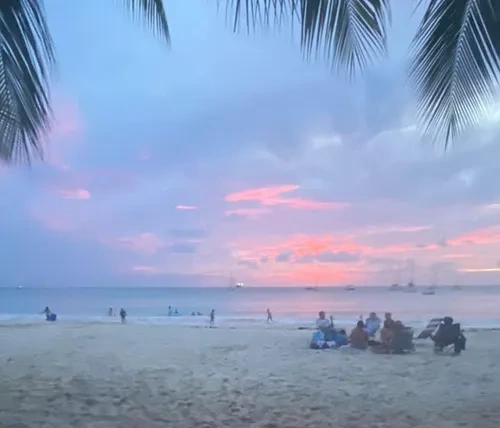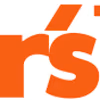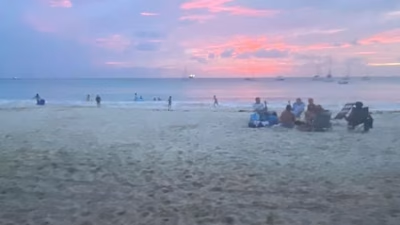Barbados Invited People To Move There During COVID. Here's What…

A photo the author took on the beach in Bridgetown, Barbados.
When COVID-19 hit the Caribbean at the beginning of 2020, Barbados’ government was quick to act. Early implementation of social distancing and mask-wearing meant that the island was able to mitigate the effects of the pandemic in the country and in its robust health service.
The country was not, however, immune to the financial impact created by the pandemic — in July 2020, it reported a proposed GDP growth of -5.8%. Since then, the ministry of finance has estimated that COVID-19 has set the country back around four years in terms of GDP.
As tourism jobs were lost and the price of food increased, officials acted quickly to offset the losses. In August 2020, Barbados opened its borders to remote workers and digital nomads with the launch of the Welcome Stamp visa`, an attempt to make up for some of the island’s lost tourism revenue.
By September 2020, the Caribbean island had made over $1 million on the cost of the visa alone. The full extent of Welcome Stamp spending is not yet known, but there can be little doubt that the “Stampers,” as they’re now known, have helped the Barbadian economy with their presence.
The Welcome Stamp allows applicants who meet the visa criteria to relocate to the island for a 12-month stay with an option to extend. So does living and working on a tropical island live up to the hype?
When the pandemic hit the U.K., I was working as a lecturer at a further education college in Scotland. I had been thinking about making a career change for some time, but never took the idea too seriously. The onset of COVID-19 and the dramatic shift in working conditions changed everything for me almost overnight.
I initially moved to a work-from-home situation with interim plans to return to work a few weeks later. As a single parent with my toddler, Leo, at my feet, I found my new working situation overwhelming. The weeks wore on, and it became evident that my school wouldn’t return to normal as hoped. The lockdown dragged on.
Working full time from home with Leo in a confined space became too much. I suffered a massive anxiety attack that hospitalized me in April, and I knew that something had to change.
Over the following weeks, I left my job and began working on building a business that I could operate remotely. I began freelancing as a journalist and writer and, more recently, became a certified life coach. I realized that I wasn’t the only person who had reevaluated their lives during COVID-19. I wanted to give back to others, especially other women who wanted to make big changes in their lives. Working for myself brought its own pressures, but I found myself with more freedom than I ever could have imagined.
It was around that time that I saw an ad for Barbados’ Welcome Stamp visa. Wanting to push myself and take advantage of finally being untethered to a specific work place, I figured, why not try something completely new in a completely new place? When else was I going to get this kind of an opportunity?
I submitted my application in December 2020. From start to finish, the whole process was fast, efficient and ran so smoothly it had me questioning if it was too good to be true. My hand was shaking when I pressed the “pay now” button for the visa. I couldn’t believe that I was about to go and live in Barbados.
As soon as I paid, my electronic visas were delivered to my inbox and it was all systems go. I packed up my house, secured my lease in Barbados, and booked flights, PCR tests and quarantine accommodations for Leo and me. Before I had time to take it all in, we were headed to the Caribbean. It felt surreal.
When I arrived at Heathrow Airport and showed the Virgin crew my e-visa, they were confused by it. They hadn’t seen one before and my stomach sank. It’s a scam! I thought. I’m going to arrive in Barbados and they’re going to put me right back on a flight home.
Well, I’ve been in Barbados for a few months now and we are all settled in, so I can happily say the program is real ― and amazing!
The author.
The Grantley Adams International Airport in Christ Church, Barbados, was efficient and well-organized and we filtered through the different “stations” before collecting our bags and exiting.
First, we had to give our names and quarantine location, and officials at the airport made sure they could match us up in the system. Then we were given an electronic bracelet and a staff member helped us set up our BIMSAFE app. The app connects to the wristband and monitors your location. Every morning and evening, you input your temperature and report if you have any potential COVID-19 symptoms. If the app stops working, the Ministry of Wellness gives you a call to check that everything is OK.
The hotel where we were required to quarantine was excellent. We had a private pool and food delivery. The hardest part of living in there was trying to force myself out of holiday mode and get some work done.
My son and I got our second PCR tests five days after we arrived and our results came back within 48 hours. With our negative results in hand, we were on our way to our new life.
The drive to our apartment introduced us to our new home. There was the heat, the sugar cane and the country roads. The were the huge potholes, the crazy driving and the ZR buses that whizz all over the island, honking air horns. The taxi driver slowed down on a street full of traditional wooden chattel houses and yelled over a chainlink fence to a young boy, around 11 or 12, who was walking out of a pastel green house carrying a cricket bat. They exchanged pleasantries and then we sped up and headed on our way.
When we arrived at our apartment in Bridgetown, I met my landlord. He was a lovely older man who showed me around our place and taught me how everything works. Leo and I got settled in and unpacked, but, unfortunately, our new life couldn’t begin just yet.
Barbados had announced a four-week lockdown two weeks before we arrived and everything on the island was closed ― even the pool at our condo. We buckled down in our apartment for another couple of weeks and then, as the island started a phased reopening in March and April, we finally began to explore our new home.
First, the pool in our building opened. Then we were able to use the beach between 6 a.m. and 9 a.m. and 3 p.m. and 6 p.m. Though we were still in lockdown, at least we could go swimming and to the beach. The thought of that alone lifted our spirits.
Barbados opened fully in April, and Leo started school after Easter. I took my laptop to a co-working space and was more productive for those first few days that Leo was at school than I had been for weeks. I picked him up at 12:30 p.m. and we took a road trip and visited the beach. I finally felt like we were home.
But two days later, the sky turned black. It was the strangest sensation to wake up to darkness. La Soufrière Volcano had erupted on neighboring St. Vincent and the ashfall on Barbados was more than significant. The initial explosions were so powerful that they propelled debris high up into the stratosphere. The easterly winds blew the ash over 100 miles to our island where it began to fall. The westerly trade winds that blow around Barbados swept the debris back onto the island and we were hit with a double whammy.
Back into lockdown we went, but this time was different. The mood on the island felt different. People were scared. We had no idea when the ashfall would end and the debris was highly toxic. We were locked in with closed windows and doors, no air circulating and stifling heat.
The ashfall was so severe in Barbados that the cleanup efforts on the island led to water shortages. Tankers were out cleaning main roads. Initial cleanup efforts were concentrated on the airport and ports to get them reopened.
The panic on the island was so bad that there were some people who chartered boats to neighboring islands with open airports. No one knew how long the cleanup would take and when the airport would reopen. Barbados’ government worked tirelessly, and one week after closing, the airport reopened. There is still a dusting of ash on every surface in my apartment ― we clean every single day and, a few hours later, it’s back again.
Throughout all of the chaos, the people of Barbados worked together to assist with the cleanup and to help their neighbors on St. Vincent. Amid the evacuations and the limited number of spaces in camps due to COVID-19, volunteers managed to pull together 1,000 cases of water for those who had been evacuated from St. Vincent. Barbados Prime Minister Mia Mottley held talks with cruise ship companies who had taken COVID-19 refuges from around the island during the past year.
The companies agreed to help with evacuations and, for the first time since I arrived on the island, the cruise ships left Carlisle Bay to help with evacuation efforts in St. Vincent.
Through it all, I never considered returning to the U.K.
The author's son, Leo.
Life on Barbados is a far cry from my old life. Leo and I go out at night here and meet new people and see new things, which is something I never did with a toddler back home. We wake up early (at least I do) and get all of my work finished, so my day is free to spend exploring with my son.
I found a great community on this beautiful island and I made friends almost immediately. I’ve had people check in on me and help me with whatever I need. The sense of community here is astounding and even though it’s just Leo and me, I haven’t ever felt lonely.
What’s more, the time we’ve spent in Barbados has given me opportunities to see myself differently. I realized I had far more inner strength and resilience than I ever imagined. There’s so much I want to do ― and now know I can do! ― and I can’t wait for whatever else this island has in store for us.
Despite all of the adventures and the ups and downs, I feel lighter and happier here than I ever did back home, and for now, I have no intention of leaving.
Lee Yeaman is a freelance writer and journalist and a political outreach correspondent with ImmigrationNews.co.uk. She is also the founder of The Goddess Clan Coaching, a coaching service that helps women find their passion and purpose so that they too can design their dream lives. For more from Lee, visit her on Facebook at @thegoddessclan, on Instagram at @thegoddessclan and you can reach her directly at writerlee01@gmail.com.
Do you have a compelling personal story you’d like to see published on HuffPost? Find out what we’re looking for here and send us a pitch!
We Need Your Support
Other news outlets have retreated behind paywalls. At HuffPost, we believe journalism should be free for everyone.
Would you help us provide essential information to our readers during this critical time? We can't do it without you.
Can't afford to contribute? Support HuffPost by creating a free account and log in while you read.
Already contributed? Log in to hide these messages.
Related
At 65, I Just Posed For Playboy 40 Years After My Centerfold And I Couldn't Be Prouder
My Best Friend Was A Con Artist Who Scammed Me Out Of $92K. Here's How I Got Justice.
I Moved Across The World To Be With A Guy I'd Spent Only 8 Days With. Here's Why.
Like this project
Posted Dec 9, 2024
"My hand was shaking when I pressed the 'pay now' button for the visa. I couldn’t believe that I was about to go and live in Barbados."
Likes
0
Views
6
Clients


HuffPost

Fodor’s Travel






